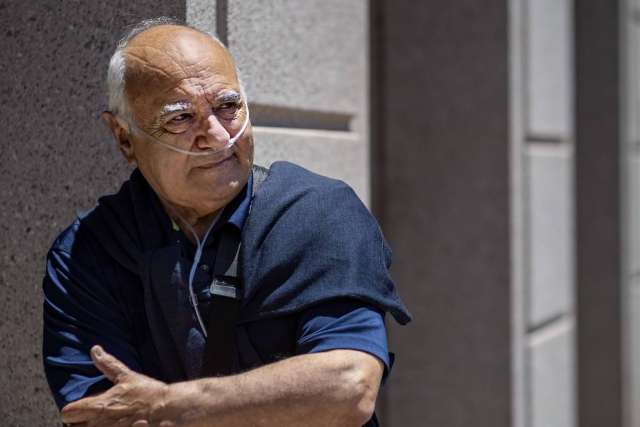A UCLA Health/LA Opera program that helps long COVID-19 patients strengthen their lungs through singing and breathing exercises has proven such a hit that it could expand to a wider audience.
Since May 2021, 45 UCLA Health patients who are struggling with post-infection symptoms including breathlessness, fatigue and brain fog have logged on to Zoom for free, therapeutic sessions led by LA Opera’s professional singers.
They work on building breath capacity and control, practice mindful meditation techniques, and sing lullabies, pop anthems, folk songs and spirituals.
UCLA Health hopes to conduct formal research on the results, but so far many participants have reported improvement in their stamina and mental health.
“As a pulmonologist, the LA Opera program has been for many of my patients the best medicine, and in many ways the best intervention that I’ve been able to use to really help these patients improve,” said Kristin Schwab Jensen, MD, co-director of the Post-ICU Recovery Clinic. “It’s such a good adjunct to the medical and other treatment options we have for long COVID. It’s also teaching a technique that people can take with them for really the rest of their life.”
Ellen Wilson, PT, executive director of therapy services for UCLA Health, is exploring the possibility of expanding the program to other academic medical centers. Wilson said a group of hospital systems could contribute financially to the costs, and their long COVID patients could easily join from anywhere.
“I think the Zoom platform has made it really successful because it’s so easy to access,” she said. “Also, it’s fun and low pressure for patients that have been through a really intense situation with their COVID. It’s a happy hour once a week that gives them camaraderie and joy.”
Roots in England
Jazz singer Rhondi Charleston of Rhondi Charleston Studios pitched the idea to LA Opera Connects, which oversees community engagement and education, and UCLA Health. Following the example set by the English National Opera, LA Opera developed a unique program.
The six-week classes are led by LA Opera teaching artists Michele Patzakis, DMA, and Nandani “Nani” Sinha.
Patzakis, a soprano who has studied vocal arts medicine, said the participants are learning the same breathing exercises to aid in their recoveries that opera singers do to perform with their renowned respiratory endurance.
“We’re taking it out of the medical realm,” she said. “It normalizes it, which I think is really important, and shows the discipline of it. Opera singers know we don’t just do things a few times and suddenly, miraculously, everything works perfectly. We are very disciplined and we know it’s slow and methodical work over time.”
She said participants not only learn how to take longer, deeper inhalations and improve breathing efficiency, but the exercises decrease anxiety by calming the nervous system.
“Anxiety is a big factor in their recovery because they have anxiety around breathing,” Patzakis said. “This program is not just about physical health, it’s also about our mental health. It’s able to address both of those realms.”
The singing component introduces a fun element with tunes that are easy to sing and draw on a diversity of backgrounds. The sessions have included “Let It Be” by the Beatles, “This Land is Your Land” and “Amazing Grace,” as well as songs in French, Spanish and Greek.
No singing experience or ability is required and participants are free to mute themselves if they prefer.
During each class, participants have the chance to share how they’re feeling, whether they’re dealing with a relapse, doctor’s appointments or preparing to return to work.
“There’s been a lot of isolation,” Patzakis said. “We really bond through this class. They really look forward to being able to connect with others who have gone through the same experience. It’s been an important factor in why they come back again and again.”
Participants have also met outside of Zoom. Last fall, a group from the class and their families went with Patzakis and Sinha to an LA Opera performance of “Tannhäuser.”
Seeing improvement
UCLA Health has treated more than 34,000 patients with COVID-19. More than 20% of acute patients have developed long COVID, which can last months, weeks or years.
Wilson said so far preliminary data show improved psychological well-being among class participants as well as better endurance.
“They can walk to get their mail easier without being short of breath or they can attend more social events without getting dizzy,” Wilson said. “Their activity tolerance overall is better.”
Dr. Jensen, who is medical director of UCLA Pulmonary Rehabilitation, said she’s seen improvement in pulmonary function among some participants when they are monitored while walking on a treadmill.
Others have reported sleeping better and experiencing less pain since joining the program.
“The power of song and music in terms of stress reduction is certainly a large component to it,” she said. “There’s just so much in terms of the connection between the mind and the body and so much that we’re still trying to understand as physicians.”
Dr. Jensen said she would love to see the program open up to a wider group of people, noting that some of her patients describe the classes as the highlight of their week. She said participating remotely has also been beneficial for patients who limit activities because of worry about the possibility of re-infection.
“They oftentimes are so much more careful and hesitant in many ways to go outside, so having that online peer community is important,” Dr. Jensen said.
Healing through song
Marcelo Olavarria, 79, has been a part of every group since the program launched. The retired airline manager contracted COVID-19 in late 2020, before vaccines were widely available. He was hospitalized at UCLA Santa Monica Medical Center for roughly a month.
Before his illness, he loved singing and refereeing youth soccer games. The program has allowed him to gradually re-build his vocal strength and he hopes to return to the soccer fields in the fall.
“Michele and Nani are expert pros,” he said. “They’re very understanding of the effort that the participants are doing. It’s wonderful. If I’m allowed to continue, I’ll show up every Friday.”
During his time in the program, he’s experienced progress and setbacks. He no longer needs supplemental oxygen, but after passing out several times he underwent a procedure for a heart pacemaker to regulate his heartbeat.
Though COVID-19 can cause damage to the heart, he said his doctors don’t know if that was the cause.
“It was very scary,” Olavarria said. “It’s still in discovery of what the after effects are. A lot of the symptoms described as post-COVID, I’ve recovered from some of them but there are others that I’m still struggling with.”
Olavarria said he’s been moved by the experiences of other class members who endured more harrowing battles with the virus. For instance, he watched a CNN story on the program that featured a father of three teens who was intubated.
“I broke down – it really, really hurt me. It really affected me,” he said. “I felt so bad for him. He had it worse than I did.”
Getting to know the challenges and backgrounds of other participants has helped him gauge his own progress and expectations. He said singing provides him with a sense of relief and self-expression.
“It’s like belonging to something that we all have in common, which is recovering from COVID,” Olavarria said. “It’s really an endless dedication to be aware that you can recover from this thing. You can improve even though there are some setbacks.”
Learn more about long COVID treatment at UCLA Health.
Courtney Perkes is the author of this article.
Related:
LA Opera singers helping COVID-19 survivors regain lung function
COVID-19 survivors learning to breathe again with training from LA Opera vocalists



